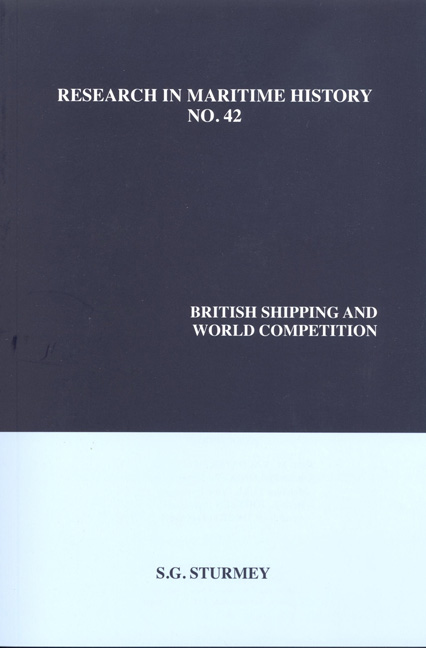Book contents
- Frontmatter
- Table of Contents
- Series Editor's Foreword
- About the Author
- Preface
- Figures and Tables
- Chapter 1 The Problem Defined
- Chapter 2 High Water: The Pre-1914 Period
- Chapter 3 War and Reconstruction
- Chapter 4 The Troubled Years: The Interwar Period
- Chapter 5 Nationalism in Shipping in the Interwar Years
- Chapter 6 The Birth of the Liberty
- Chapter 7 The Prosperous Age: The Postwar Period
- Chapter 8 Enemies of Competition in the Postwar Years
- Chapter 9 Flags of Convenience
- Chapter 10 Economics of Shipping Enterprises
- Chapter 11 Shipowning and Resource Allocation
- Chapter 12 Labour Relations and Labour Costs (by Basil Mogridge)
- Chapter 13 The Conference System
- Chapter 14 The Structure of the British Industry
- Chapter 15 The Question Answered
- Epilogue The Future
- Appendix The Contribution of British Shipping to the Balance of Payments
- Bibliography
- Index
Chapter 5 - Nationalism in Shipping in the Interwar Years
- Frontmatter
- Table of Contents
- Series Editor's Foreword
- About the Author
- Preface
- Figures and Tables
- Chapter 1 The Problem Defined
- Chapter 2 High Water: The Pre-1914 Period
- Chapter 3 War and Reconstruction
- Chapter 4 The Troubled Years: The Interwar Period
- Chapter 5 Nationalism in Shipping in the Interwar Years
- Chapter 6 The Birth of the Liberty
- Chapter 7 The Prosperous Age: The Postwar Period
- Chapter 8 Enemies of Competition in the Postwar Years
- Chapter 9 Flags of Convenience
- Chapter 10 Economics of Shipping Enterprises
- Chapter 11 Shipowning and Resource Allocation
- Chapter 12 Labour Relations and Labour Costs (by Basil Mogridge)
- Chapter 13 The Conference System
- Chapter 14 The Structure of the British Industry
- Chapter 15 The Question Answered
- Epilogue The Future
- Appendix The Contribution of British Shipping to the Balance of Payments
- Bibliography
- Index
Summary
The interwar period was marked by a growth of national consciousness and, in particular, by a widespread desire among nations to see their flags represented, or represented more powerfully, in the mercantile marines of the world. The reasons for this were many and need not be discussed here. The consequence was the spread of subsidies, preferences legislation and the adoption of trading methods favouring national shipping. Among the latter, particular reference should be made to the extension to other countries of the British practice of selling exports c.i.f. and buying imports f.o.b. so that the nomination of the carrying ships was the prerogative of a national. British shipping found it hard to counter this movement which was an extension of a trading condition on which British shipowners had insisted when they were in a position to insist. The attempts of British shipping interests to induce British traders always to adopt such terms in their international trading transactions were largely unsuccessful. This lack of success arose from the curiously ambivalent attitude of non-shipping interests in Britain to British shipping; on the one hand was an unquestioning belief in the superiority of British shipping and British ships, while on the other was a marked lack of sympathy for British shipowners. The second part of this attitude arose from a multitude of causes, including the imperious attitude of many liner companies, the manner in which shipping interests had profited in the early years of the war, the bad taste left by the speculative deals of the immediate postwar years and the general distrust of the concentration and cartellization of much of the industry. Despite, perhaps because of, this ambivalent attitude, there was the same type of jingoist propaganda for shipping in Britain as in other countries. This was reflected, for example, in the government loan to Cunard and in the conditions of the tramp shipping subsidy (see p. 93). When considering the nature and extent of nationalism in assisting the shipping of other countries, it must not be overlooked that British shipping was not free of these influences: the real difference was in the degree of success achieved by different national shipping interests in enlisting the sympathies of their fellow nationals.
The nature of the formal assistance given to shipping in the interwar years is indicated in table 5.1.
- Type
- Chapter
- Information
- British Shipping and World Competition , pp. 83 - 116Publisher: Liverpool University PressPrint publication year: 2009

